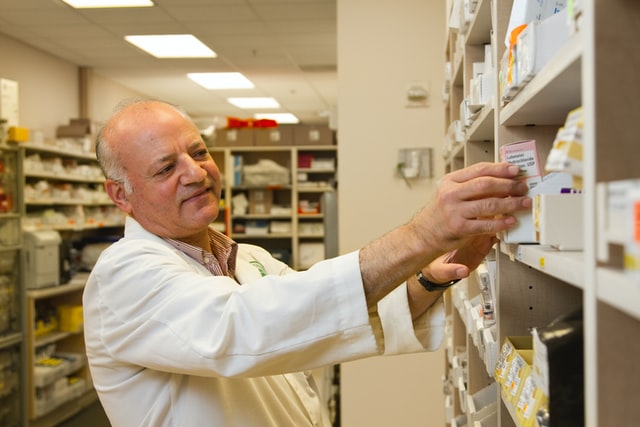We believe that pharmacists and all potential pharmacy owners and managers should have access to all the necessary information, finance options and support they need in order to successfully open, start and finance their pharmacy business.
Whether you are a qualified pharmacist or already a pharmacy owner, buying, starting or running a pharmacy could be a rewarding next step for you.
We can help provide financing for:
- Purchasing a pharmacy
- Refurbishment funding
- Specialist equipment/technology asset finance
- Equity purchase
- Tax funding
- Commercial mortgages
Do banks like to lend to the pharmacy sector?
The first place most would-be pharmacy owners will go to seek finance to buy or grow a pharmacy would be the high street banks.
All banks have different risk appetites, and while this varies from sector to sector (as well as individual circumstance), most banks consider pharmacists and pharmacy finance as being a relatively low risk and a good investment. Generally, the pharmacy sector is seen as a green sector which means banks and quite often happy to lend to pharmacists.
Why is there more demand for pharmacies at the moment?
There has been a big increased demand for pharmacies, especially within the last years. Pharmacies have definitely been one of the few businesses that traded well during the entire rise of the Covid-19 pandemic outbreak and through the following lockdowns.
This has also meant that pharmacy goodwill values have also held up throughout the entire pandemic. Pharmacies are businesses that are a necessary and vital service to all local communities (e.g. helping with the vaccination program).
It is also important to note that there is a barrier to enter the market. There are restrictions to where new pharmacies open. There are rules about not being able to open a new pharmacy right next to an existing pharmacy. This could in fact work to your advantage as it diminishes the amount of competition in the area which gives your pharmacy a higher/ better chance to succeed.
The Decline of Pharmacies in the UK: A Growing Opportunity
In the last few years, the number of pharmacies in the UK has been dropping. Many local pharmacies have had to close because of money problems, higher running costs, and cuts to government funding. The National Pharmacy Association (NPA) says that around 650 pharmacies have shut down in the last six years, making it harder for some communities to get the healthcare they need.
This has hit rural areas the hardest, where small, independent pharmacies are struggling to survive. Even in towns and cities, big chains or online services are replacing local pharmacies, but they can’t always offer the personal care and advice that people appreciate.
A Gap in the Market: The Perfect Time to Invest
Even though this decline may seem worrying, it actually opens up a great opportunity. People still need easy access to healthcare, and with fewer pharmacies available, there’s now a clear gap in the market. This is especially true in places where pharmacy closures have made it harder for people to get their prescriptions and healthcare advice.
Starting or buying a pharmacy now lets business owners step in to fill this gap. Local communities still need personalised care, and by offering trusted advice, customised services, and convenience, you can create a pharmacy that becomes a key part of your area. The government also knows how important pharmacies are and still provides funding for those offering extra services like vaccinations or minor illness consultations.
Why Now?
With less competition and ongoing demand, now is a great time to think about owning a pharmacy. By focusing on good customer service, being innovative, and offering a variety of services, a new or expanding pharmacy can do well even in tough times.
Seize the opportunity presented by the current market and become a vital, reliable part of your community. This is the moment to make a difference in the pharmacy field.
Action Plan
The demand for pharmacies has surged due to their indispensable role during the COVID-19 pandemic, ensuring continuous access to essential medications and participating in vaccination efforts. This sustained demand has also bolstered pharmacy goodwill values, while entry barriers limit new competition, further strengthening existing pharmacies’ prospects.
Start or buy a pharmacy?
Many pharmacists dream of owning their own pharmacy. So, what is the best way of making this happen? To build? Or to buy?
Both options come with a lot of pros and cons that you need to weigh out depending on your individual circumstances. On the downside, buying a business is often more costly than starting from scratch but it also has many added benefits.
It is much less common to start a pharmacy from scratch. This is because most areas that need a pharmacy already have one. However, if there is a gap in the market, it is possible to fill it.
Action Point
Starting or buying a pharmacy both have their pros and cons. While starting from scratch offers more control but requires significant investment and market analysis, buying an existing pharmacy provides immediate clientele and established infrastructure at a higher initial cost. The decision depends on factors like market demand, financial resources, and entrepreneurial goals.
Setting up a pharmacy
Setting up and building your pharmacy business from scratch is often accompanied by some substantial costs.
To begin with, there will be the cots for the premises itself, which is most likely to be a rental agreement for at least the first couple of months or even years. The costs of applying to physically set up your pharmacy are fairly minimal however, you will need to set some money aside for necessary NHS contracts and premises registration fees. There also may be additional planning fees if a specific change of use is required.
Action Plan
Setting up a pharmacy involves substantial costs such as premises rental and regulatory fees for NHS contracts and premises registration. Budgeting for these expenses is essential for a successful establishment.

Contact us to find out more
Registering a pharmacy in the UK
A pharmacy can only be registered by a pharmacist, a partnership consisting entirely of pharmacists or a corporate (usually a limited company). There are two key parts of the process of registering your pharmacy in the UK. The first is to make an application to the local NHS England Team for inclusion in the pharmaceutical list. Before a registered pharmacy can dispense This process can take from four months or even longer in event of appeals. The second is the pharmacy premises needs to be registered with the General Pharmaceutical Council which can also take up to 3 months.
What does a start up pharmacy need to fund?
If you’re going to start a pharmacy from scratch, you’ll need to purchase the property, the equipment, consumables, everything! These are the kind of costs you’ll need to consider and factor into your projections.
- Inventory, consumables and supplies
- Equipment
- Staff
- Property
- Technology/IT
- Marketing
- Legal & insurance
- And more…
Action Point
Starting a pharmacy from scratch in the UK requires funding for various essentials including inventory, equipment, staff, property, technology, marketing, legal, and insurance. These costs must be carefully budgeted for and factored into financial projections.
How to open a pharmacy in the UK
There are two key parts to the process, the first is to make an application to the local NHS team in order to be included in the pharmaceutical list. Before a registered pharmacy is able to dispense prescription issues under the National Health Service, it must be included in the pharmaceutical list relating to a Health and Wellbeing Board Area.
It is important to note that this process can take up to four months or even longer in the event of appeals. The second is that the pharmacy premises must be registered with the General Pharmaceutical Council (which can take up to 3 months).
Action Point
To open a pharmacy in the UK, you must apply to the local NHS team to be included in the pharmaceutical list for dispensing prescription medicines under the National Health Service (NHS). This process can take up to four months or longer. Additionally, the pharmacy premises must be registered with the General Pharmaceutical Council, which can take up to three months.
Assemble a team of advisors
Tapping into some expert advice may be pricey, but will be essential for you. Find a solicitor who understands you, your business plans and goal and most importantly someone who understands the independent retail pharmacy business. Having a financial broker will also help you immensely. One of the first steps in starting your business is setting up its legal status. You will also need advisors in real estate and insurance as well as lenders who are all instrumental in making your pharmacy business real. To create your own team of expert advisors you can start by enlisting our help with funding and accounts.
Create a solid business plan
Creating a business plan is one of the most important things that you need to take time out to perfect. In a way there is always a demand for people’s pharmaceutical needs. However, most of your potential customers may already be going somewhere else for all their pharmacy needs. Because of this, your business plan needs to specify why those customers will come to your pharmacy instead.
Action Plan
To open a pharmacy in the UK, gather a team of advisors including a solicitor, financial broker, real estate advisor, insurance advisor, and lenders. They’ll assist with legal, financial, and operational aspects. Craft a strong business plan highlighting reasons why customers should choose your pharmacy.
Find the optimum location
When it comes to any retail business it’s always location, location, location. It is the most critical success factor. In order to choose where the optimum location to open you pharmacy will be you must consider:
- Traffic: Are your ‘ideal customers’ likely to travel to this location?
- Visibility: Will your pharmacy be easily visible to attract customers to provide a constant flow of business to your pharmacy?
- Access: Does this location allow people to easily enter and exit? Is there parking or even a drive through option?
- Size: Can your pharmacy grow in this location?
You need to do your research! Has an independent pharmacy recently closed in the area? If so, it is important that you understand the reasons why. This may present an opportunity for you to capture a customer base that was already going to an independent pharmacy. It is also important to note that you will probably only have a six-month window to save that existing customer base.
Even the largest retailers such as KFC and Starbucks conduct extensive research before settling on a location, so maybe having one of them near you is a good sign. If you are able to set your pharmacy apart with your unique products and services, your pharmacy can thrive being near one of the big chain pharmacies.
When choosing a location for your pharmacy you need to also consider the proximity of other businesses.
Action Plan
When selecting the optimal location for your pharmacy, consider factors like traffic, visibility, access, and size. Research recent closures of independent pharmacies in the area to understand opportunities. Proximity to big chain pharmacies can be beneficial if you offer unique products and services. Also, consider the proximity of other businesses in the area.
Financing options for a pharmacy
Like any small business owner, it is important to pick the right financing option for you. At this stage, having a financial advisor or broker is crucial to begin the process as there are many financing options available including loans from traditional lenders such as commercial banks. There are 3 key elements that most lenders are primarily looking for:
- Good credit history
- Sufficient working capital
- A significant initial upfront investment
When you are preparing to ask for a loan, your business plan and financial statements should include three types of funding:
- Built-out capital to pay for the building of the store itself and any renovations, fixtures or any other fixed assets.
- Opening inventory financing, this is to pay for the initial stock you need to acquire to stock your pharmacy. While wholesalers can usually provide favourable terms for you it is highly unlikely that you will have a positive cash flow for at least the first six months.
- Working capital in order to fund day to day operations such as utilities, bills and payroll.

Contact us to find out more
Action Plan
When financing a pharmacy, traditional lenders offer loans requiring good credit history, working capital, and a significant initial investment. Funds for built-out capital, opening inventory, and working capital are essential. Buying an existing pharmacy can be profitable with proper evaluation and a skilled team. Consider fees and explore options like buying out a partner or acquiring shares.
Buying a pharmacy in the UK
Buying a pharmacy, especially one in the right location, can definitely create a good profit. You might decide to buy an existing business rather than start your own venture from scratch. The biggest advantage of buying an existing pharmacy is that products, staff, premises, equipment, regular sales and customers are already in place.
However, buying an already operating business can be hazardous and if you aren’t careful, an extremely expensive process. This is why having the rightly skilled team in place from the get-go is so important. The team with the right skills, experience and legal know-how will be able to ensure that you do not have to pay through the roof.
Income streams and future cash flows from existing businesses are a lot easier to predict than if you were to start the business fresh from the ground up. You are in an even better position if you are able to assess the performance of the business to understand its current cash flow and value. It will be easier to agree to a price that works in yours and the seller’s best interest.
You need to also consider solicitors and accountant fees that you will need to pay. If the business you are trying to acquire is a large practice, you may need to do so as a partner. Another great option for you would be to buy out a current partner who may be retiring or selling their shares. We recognise that there are many challenges that come with Buy In and Buy Out finance and its provided funding tailored to help you make full use of the opportunity.
What information should you look at when buying a pharmacy?
- Local Competition.
- GP practice in the local area – patient numbers.
- Number of prescriptions that the pharmacy is doing.
- The over the counter sales (OTC).
- Cash flow, debts and assets of the business.
How long does it take to buy a pharmacy?
Once you have found a pharmacy that you would like to purchase, there are a few factors that can impact the time scale such as:
- Transfer of the property lease – third party landlords.
- Change of ownership – you will need approval from NHS England.
- Due diligence – make sure you use a specialist Pharmacy solicitor.
It is almost impossible to say how long any given sale of a pharmacy will take. On average, you will be able to realistically buy a pharmacy in 3-6 months.
Action Plan
When buying a pharmacy, consider local competition, patient numbers, prescription and over-the-counter sales, and the pharmacy’s financial health. The timeline for purchase varies but typically takes 3 to 6 months, contingent on factors like lease transfer, NHS approval, and due diligence.
Costs to consider when buying a pharmacy
The purchase of a Pharmacy is a major financial commitment and for most, a long-term one
Of course, you most likely need to raise acquisition finance to purchase the actual pharmacy business. You will also need to take into account any leasehold or freehold costs, or any rent and business rates.
When you are buying a pharmacy there will be many ongoing expenses that you will have to prepare for such as security measures, leases and payroll for your employees. Your largest expense is and will remain to be maintaining your prescription medication supply.
It can be difficult to maintain as you must always have enough on hand to meet monthly demand while ensuring that no medicine that you have expires before it is dispensed. Salaries and payroll come as a very close second.
You will also need to consider your ongoing costs for IT and cybersecurity, accounts, tax and marketing.
Action Plan
When purchasing a pharmacy, consider upfront costs like acquisition finance, leasehold or freehold expenses, and ongoing expenses such as security measures, payroll, and prescription medication supply. Additionally, budget for IT and cybersecurity, accounting, tax, and marketing.

Contact us to find out more
How can Samera business advisors help secure funding to purchase a pharmacy?
At Samera, we are committed to offering you financial services that will fit your business needs as well as your personal ones. We have a team of former bankers, all with extensive experience in the UK’s healthcare lending sector. We understand the sector and have the necessary contacts to ensure you get the best terms available and we connect you with the right contacts to make sure you get the best experience while obtaining your new pharmacy.
How much deposit do you need to buy a pharmacy?
We typically see pharmacists achieving 70-90% LTV (loan-to-value) rates, meaning you will often need a deposit of 10-30% of the value of the business. It all depends on the strength of the business you wish to purchase though.
What will the bank need to see before they lend?
Target Pharmacy
- Last three years accounts
- Sales particulars
- FP34 Statements – Can often take minimum 6 months
This information will give you an indication of how the business has been trading over a period of time. What is the turnover, how many prescriptions have they undertaken (is this consistent) and what are the business profits?
Personal information
- CV
- 6 months personal bank statements
- Personal profile form
- Last two years tax returns
This information is important as lenders want to understand what experience you have as a pharmacist, have you taken on any extra management responsibilities that would help you run a business.
Banks also want to understand how you conduct your personal finance, are your personal accounts well run, do you have assets in the background (property/cash)?
Action Plan
At Samera, our expert advisors specialize in securing pharmacy acquisition funding. With tailored solutions and industry connections, we help pharmacists navigate the lending process. Typically, a deposit of 10-30% is required, with loan-to-value rates ranging from 70-90%. Banks assess eligibility based on financial documents and personal information provided by the applicant. Our streamlined approach ensures efficient financing tailored to your needs.
Funding options for pharmacists in the UK.
When funding your pharmacy, whether it be to start, buy, grow or maintain the business, you have various financial options.
- Acquisition finance.
- Buy out a business partner/partner buy in finance
- Asset Finance
- Smaller loans to help with cashflow or stock purchase.
- Relocation loans – Help to move the pharmacy, maybe into a GP practice.
- Refurbishment loans – It is more important than ever for pharmacies to have the right clinical look or to add a consultation room.
- Tax loans.
The pharmaceutical profession, like many others in the healthcare sector is highly competitive. As the demand for chemists is continuously increasing, you can find chemists on every high street, many of which are large chains or franchises. If you are working as an independent pharmacy, you will need to find a way to provide the same level of equipment as they do, which is one aspect that Samera specialises in.
We can help you find the right type of funding for all your pharmacy needs such as:
- Setting up a new business
- Acquiring new premises for your pharmacy
- Acquire assets and equipment
- Paying tax
- Providing capital for growth
- Acquire a pharmacy franchise
We help to match pharmacists with lenders and loaning options that are best designed and suited to you and your business specifically to assist with the growth and development of your business. The market for loans and finance options is so crowded that you may need assistance with finding the right financing option for you. This is where we are able to use our contacts and expertise to help you build your business in the most cost effective way.
Action Plan
In the UK, pharmacists have various funding options:
- Acquisition Finance: For buying existing pharmacies.
- Partner Buy-In/Buy-Out: Partner-related financing.
- Asset Finance: Equipment funding.
- Working Capital: Small loans for cash flow.
- Relocation and Refurbishment Loans: Premises-related financing.
- Tax Loans: Covering tax obligations.

Contact us to find out more
Unsecured business loans
Like many types of financing, Unsecured Business loans provide you with a large sum which you will agree to pay back over a certain term including interest. This is usually done through fixed monthly repayments.
They are much like personal loans and are quite easy and simple to arrange. Lenders choose to approve your loan request based on various factors including your personal credit history and the credit rating of your business.
Unsecured loans differ from secured loans in that they do not require you to put up any assets as security or collateral. This means that in the unfortunate event that something is to go wrong and you are unable to keep up the repayments of your loan, the lender will not be able to seize any assets.
However, to make up for the lack of security on the loan, lenders usually expect a personal guarantee from you and any business partners you may have. This will ensure to the lender that you will be able to make the repayments even if your business cannot. You can usually secure less money through an unsecured loan, due to the risk to the lender. You may also face higher interest payments.
Why you need Samera to arrange an unsecured loan for you.
In this day and age there are many unsecured loan providers for Pharmacists in the UK ranging from traditional high street bank lenders to the new generation of online lenders. All of whom have terms and rates that vary substantially.
Finding the right lender for you is essential to minimise the cost of your borrowing. Here at Samera, we work with you to ensure that you get the loan that is most favourable to your needs. We use our knowledge of the UK market to find lenders that suit you with the most competitive deals.
Action Plan
Unsecured business loans, akin to personal loans, don’t require collateral but may necessitate a personal guarantee. Samera specializes in securing these loans for UK pharmacists, offering tailored solutions with competitive terms from a range of lenders, ensuring minimal borrowing costs.
Secured business loans
Secured loans can be one of the most cost effective ways to borrow large amounts at once. If you are looking to borrow from £50,000 or more, a secured loan will probably be a good option for you. A major advantage of using secured loans as a means of financing your pharmacy is that it can cut the cost of borrowing and can help you borrow larger amounts than other types of lending.
Secured loans are ‘secured’ by something you use as security in case you cannot pay the loan back. This ensures the lender that in the event that you are unable to repay back the loan, they can possess whatever assets you put up as security instead. If you do not repay as upon the agreed terms, the lender had the right to take ownership of the assets. Assets can be anything of value such as estate, cars or stock.
You are usually able to borrow more through secured loans as they are less risky for lenders. This is why they are usually a more cost effective option as they can have lower rates of interest than Unsecured loans.
Why do you need us to arrange a secured loan
Just like unsecured loans, secured loans have many different lenders offering various terms and rates and each of their rates vary substantially based on the ‘security’ being offered. We use our expertise and contacts to ensure that we find the most appropriate lender for you with the most competitive deal. We can also help you decide on the most appropriate and suitable form of security to offer.
When large sums of money and long financial commitments are involved, it pays to have expert support on your side to guide you through what is often a stressful process. Our aim is to use our expertise to ease the stress and burden off you so you can focus on what you do best in your business.
Action Plan
Secured business loans offer a cost-effective solution for borrowing larger sums, typically £50,000 or more. With assets like property or inventory serving as collateral, lenders are assured repayment, often resulting in lower interest rates compared to unsecured loans. Samera helps pharmacists navigate secured loan options, securing favorable terms to support business growth.
Leasing
Leasing is often a great idea if you want to maximise the use of the equipment you need without the full expense and responsibility of owning it. Leasing gives you the flexibility and freedom that could work in your favour.
With leasing you receive up to date equipment which allows you to always be ahead of your competitors and there are no upfront deposits required which works well for your cash flow.
You also have easier cash flow budgeting as repayments are fixed. The repayments are usually tailored to suit your individual circumstances. Leasing is also tax efficient as repayments may be offset against taxable profit.
Action Point
Leasing offers flexibility and cost-effectiveness, providing access to up-to-date equipment without the upfront expense or responsibility of ownership. With no need for upfront deposits, leasing supports cash flow management. Fixed repayments facilitate easier budgeting, tailored to individual circumstances. Moreover, leasing can be tax-efficient, as repayments may be offset against taxable profits. Samera assists pharmacists in navigating leasing options to optimize equipment acquisition.
Buy-Ins and Buy-Outs
A management buy-out allows a company owner to sell their entire business to an existing management team. Instead of starting a whole new business on your own, you can join an existing practice. The simplest way to do this may be a Partner Buy-In. This is where you become a new partner and join an existing team.
Partner Buy-Ins are common with professional practices and may be an opportunity for an existing firm to bring in new financial partners or even new talent. The most common way to Buy-In is when an existing partner is looking to leave the business or retire.
As a new partner you will be required to put down funding to either to support the growth plans of the business or to compensate the existing partner.
Asset finance
Asset finance offers financial support for both small and medium sized businesses. It is the funding raised by usually a third party company, to either purchase or hire the necessary assets for your pharmacy business. Asset financing can work in a number of different ways and the terms of your loan will vary depending on the provider.
Samera can ensure simple, fast and transparent assets and equipment finance for you.
Action Plan
Management buy-outs enable company owners to sell their business to an existing management team, while partner buy-ins allow individuals to join an established practice as new partners. Samera facilitates partner buy-ins, supporting the acquisition process and financing needs. Asset finance provides funding for acquiring essential assets for your pharmacy business, with Samera ensuring swift and transparent financing solutions tailored to your requirements.

Contact us to find out more
Tax loans
Paying your taxes is something that unfortunately no business can escape from. Within your first 6 months of starting your business profit margins are usually quite low, and you may even run into cash flow issues. Tax loans allow you to spread out the cost of your tax demand into affordable monthly payments. They benefit your business as you will have a controlled cash flow, they often have flexible repayment terms and you will not have HMRC on your back or receive any fines as they will receive the funds from you on time. These types of tax loans are also quick and simple to arrange.
Acquisition Finance
Acquisition finance is the capital you need to obtain for the sole purpose of buying another business, like a pharmacy. Acquisition financing may be the best financing option for you to buy a pharmacy as it provides immediate resources to users that can be applied to the transaction, allowing you to meet your acquisition aspirations quickly.
Action Plan
Tax loans offer a solution to managing tax obligations by spreading payments over affordable monthly installments, ensuring controlled cash flow, and avoiding HMRC penalties. Acquisition finance provides immediate capital for purchasing a pharmacy, enabling the swift realization of acquisition goals.
Click here to read our article on How to finance a healthcare business.
Our Expert Opinion
“Understanding how pharmacy practices are financed is key to securing the best terms available. This means using a broker that knows the pharmacy market and also the banks requirements is key to funding your pharmacy practice”

Learn more: Related Articles
About the Author

Neha Jain
Neha Jain is a skilled content writer with a rich background in business and financial knowledge. With a bachelor’s degree in English Literature and Psychology, Neha has honed her writing skills, furthering her expertise with the Content Writing Master Course (CWMC) at IIM SKILLS and a Content Marketing Certification from HubSpot Academy.
Working alongside our business development experts, Neha specialises in helping accountants, dentists and other healthcare professionals start, scale and sell their businesses.
Reviewed By:
Arun Mehra
Samera CEO
Arun, CEO of Samera, is an experienced accountant and dental practice owner. He specialises in accountancy, financial directorship, squat practices and practice management.
Business Loans for Healthcare Businesses
We’ve been helping to fund the future of British healthcare businesses for over 20 years and our team are made up of former bankers with decades of experience in the UK’s healthcare lending sector.
You can find out more about working with Samera and the financial services we offer by booking a free consultation with one of the Samera team at a time that suits you (including evenings) or by reading more about our financial services at the links below.
For more information on raising finance for your healthcare business, including more articles, videos and webinars check out our Learning Centre here, full of articles and webinars like our How to Guide on Financing a Dental Practice.
Make sure you never miss any of our articles, webinars, videos or events by following us on Facebook, LinkedIn, YouTube and Instagram.




